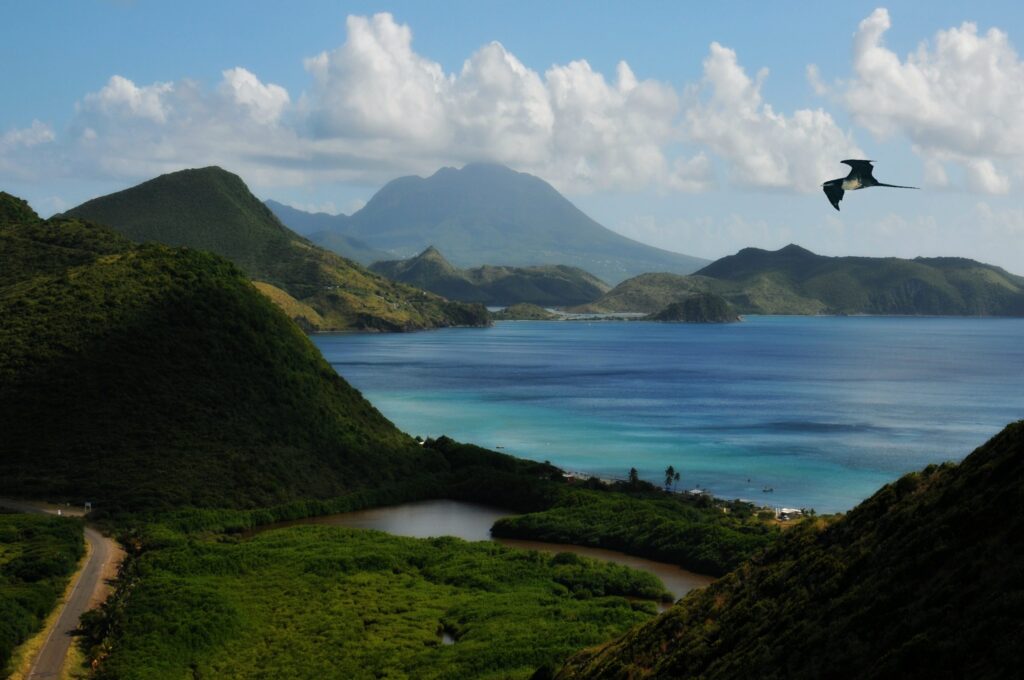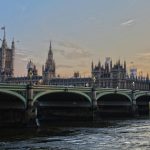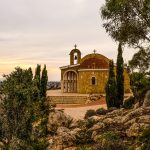
QUICK FACTS
Full name: Federation of Saint Christopher and Nevis
Capital city: Basseterre
Population: 47,854 (2024)
GDP in current prices: USD $1.13 billion (2024)
Area: 261 km²
Government: Federal parliamentary constitutional monarchy
Monarch: King Charles III
Governor-General: Dame Marcella Liburd
Prime Minister: Terrance Drew
The Premier of Nevis: Mark Brantley
Currency: East Caribbean dollar (XCD)
Time zone: GMT -4
Dialling code: 1 869
Saint Kitts and Nevis, also known as the Federation of Saint Christopher and Nevis, is an island state in the West Indies and a member of the Commonwealth. Part of the Leeward Islands chain of the Lesser Antilles, it is the smallest sovereign state in the Western Hemisphere, in area and population. The capital city, Basseterre, is on the larger island of Saint Kitts. The smaller island of Nevis lies approximately 3km southeast of Saint Kitts across a shallow channel called “The Narrows”. English is the official language but Saint Kitts Creole is also widely spoken.
St. Kitts was named “Liamuiga”, meaning “fertile land”, by its original native inhabitants the Kalinago Caribs. The name was preserved when the tallest peak on St. Kitts was renamed Mount Liamuiga on independence day in 1983. Christopher Columbus sighted what is now Nevis in 1493 and gave that island the name San Martín. The current name “Nevis” is derived from a Spanish name Nuestra Señora de las Nieves, meaning Our Lady of the Snows, perhaps in reference to the white clouds which usually wreathe the top of Nevis Peak.
Geography
The islands are of volcanic origin, with large scenic central peaks covered in tropical rainforest. There are numerous rivers descending from the mountains to empty, white-sand beaches. Beds of offshore coral, teem with fish of every stripe and colour. Although they are only 3km apart, St. Kitts is classified as having a tropical savanna climate whereas Nevis has a tropical monsoon climate.
With the beautiful nature there is a lengthy and rich cultural history. Brimstone Hill Fortress National Park, dating from 1690, is a UNESCO world heritage site that has been dubbed the “Gibraltar of the West Indies”. Tourists can see where tobacco, indigo and then sugar were grown on the historic plantations, take sweaty rainforest hikes, or relax on the sandy, palm fringed beaches. The sugar industry survived until 2005, and a unique legacy of this is the St. Kitts Scenic Railway where passengers can ride for 29km along a narrow gauge line built to transport cane.
Today the island lives by tourism, a transformation achieved with record speed. St. Kitts welcomes a steady stream of cruise ships and has a 394-room Marriott resort and casino. Major luxury property developments are taking shape and a private jet terminal and superyacht marina recently opened. It is also known for a number of celebrations including Carnival (December-January) and the St. Kitts Music Festival (June).
Economy
At the turn of the 18th century, St. Kitts was the richest British colony per capita in the Caribbean, a result of the sugar trade. The economy had traditionally almost exclusively depended on the growing and processing of sugar cane until the late 1970s, when the government backed a drive into small-scale, export-oriented industrialisation and off-shore banking sectors. On 19 September 1983, the country achieved independence from the UK. The economy of St. Kitts and Nevis experienced strong growth for most of the 1990s but a number of hurricanes contributed to a sharp slowdown, particularly in the agricultural, tourism and construction sectors.
Agriculture contributes just 1.1% of the economy, with Industry being 30.0% and Services accounting for 68.9%. Since 2010, tourism has been steadily rising again to become the largest source of foreign exchange. In 2016, Travel & Tourism directly contributed 5.9% to GDP and in total, including employment, accounted for 25.1% of GDP, a figure forecast to reach 33% by 2027. According to the IMF, St. Kitts and Nevis attained the strongest growth and fiscal performance in the ECCU region in recent years, with public debt set to meet the ECCU’s 60% of GDP target in 2018. The strong performance owes much to Citizenship-by-Investment (CBI) inflows as well as overall prudent macroeconomic policies. GDP in St. Kitts and Nevis is projected to reach around $1.05bn in 2020.
St. Kitts and Nevis is a member of the Eastern Caribbean Currency Union (ECCU). The Eastern Caribbean Central Bank (ECCB) issues a common currency (the East Caribbean dollar) for all its members, and regulates and manages monetary policy and banking. The US dollar is widely used as well. The United States is the main export and import partner, accounting for 56% of the total exports and 31.7% of imports.
Citizenship by Investment
The local passport is a Caricom passport as Saint Kitts and Nevis is a member of the Caribbean Community. Interested parties can acquire citizenship if they pass the government’s background checks and make an investment into an approved real estate development.
The Government has introduced extensive legislation to attract financial services businesses to the island. The Citizenship by Investment Programme has also been in operation since 1984, allowing foreign investors to acquire citizenship under certain conditions. This makes it the oldest existing citizenship programme in the world, as well as the most reputable citizenship programme in existence.
St. Kitts and Nevis citizenship is highly regarded. As a result, St. Kitts and Nevis citizens enjoy a passport with an excellent reputation and very good visa-free travel, including to all of the EU’s Schengen Area, Hong Kong, Switzerland, and other countries. Accordingly, the Citizenship by Investment Programme is an attractive option if one is looking to acquire a second citizenship through investment without prior residence requirements.
When you acquire citizenship under the St. Kitts and Nevis Citizenship Programme, you and your family enjoy full citizenship for life, which can be passed on to future generations by descent. As a citizen of St. Kitts and Nevis, you have the right to take up residence in St. Kitts and Nevis at any time and for any length of time. You will not be taxed on foreign income, capital gains, gift, wealth, or inheritance tax so this may complement your current wealth protection and tax planning strategies. Citizens of St. Kitts and Nevis are allowed to hold dual citizenship, and the acquisition of citizenship is not reported to other countries.
The regulations regarding citizenship by investment are contained in Part II, Section 3 (5) of the Citizenship Act, 1984. These provisions allow the government to operate a programme under which citizenship is granted to persons who qualify under criteria set by cabinet decision.
Requirements and procedures
No: 1 Sustainable Island State Contribution (SISC) – The Sustainable Island State was to boost the St Kitts and Nevis Economy in areas such as:
Local Food Production, Green Energy, this new mandate helps to diversifying the Economy
| Main applicant or a family with up to four persons including: a) A main applicant with a spouse and up to two dependants; or b) A main applicant with up to three dependants |
US$250,000 | |
| Each additional dependant under 18 | US$25,000 | |
| Each additional dependant aged 18 or above | US$50,000 |
The Sustainable Island State Contribution (SISC) is the newest investment channel under St Kitts and Nevis’ CBI Programme, introduced by Prime Minister Terrance Drew. It is the most secure and straightforward route to second citizenship.
Via SISC, a contribution is made directly to a government-held fund, with the Citizenship by Investment Unit (CIU) being able to check receipt immediately and speed up the application. The SISC represents the ongoing advancement of St Kitts and Nevis to realise their potential as a prospering small-island nation with an accelerating economy.
• The SISC offers the most straightforward route to citizenship.
• It’s a discrete channel where your privacy is ensured.
• Your second citizenship is for life, meaning that it can be passed down to future generations.
• No mandatory travel or language requirements.
• Increased global mobility with visa-free and visa-on-arrival access to over 150 countries.
• You will gain citizenship of a country with a low tax regime including no income, inheritance or gift tax
No: 2 Real Estate Investment
Applicants may qualify for citizenship through an investment in a pre-approved real estate project. The minimum real estate investment required by law is US $400,000 (resalable after seven years) or US $400,000 (resalable after seven years) for each main applicant.
The minimum investment in a single-family private dwelling home designated as Approved Private Real Estate is US$800,000 (resaleable after a 7-year minimum holding period).
On approval in principle of an application made through a real estate investment, a Government fee applies, as follows:
-
MAIN APPLICANT:
US$25,000
SPOUSE OF THE MAIN APPLICANT:
US$15,000
ANY QUALIFIED DEPENDANT UNDER 18:
US$10,000
ANY QUALIFIED DEPENDANT AGED 18 OR OVER
US$15,000
No: 3 PUBLIC BENEFIT OPTION
Under the Public Benefit Option applicants can obtain citizenship by making a minimum contribution of US$250,000 to an approved Public Benefit Projects, payable to Government Citizenship Unit
In addition to these fees, real estate buyers should be aware of purchase costs (mainly compulsory insurance fund contributions and conveyance fees).
For listed of approved real estate click here
https://ciu.gov.kn/investment-options/approved-real-estate/
The value of the real estate should be at least US $400,000, plus the payment of government fees and other fees and taxes. As the application procedure under this option involves the purchase of real estate, this can lengthen the processing time depending on the chosen property. Real estate can be re-sold seven years after the purchase and may not qualify the next buyer for citizenship. A list of approved real-estate developments is published under Approved Real Estate
Acquisition of citizenship under the SISC option requires a contribution to the Sugar Industry Diversification Foundation.
Applications for Citizenship cannot be lodged directly at the Citizenship -by-Investment Unit, instead it can only be handled by registered Authorised Persons.
THE FOLLOWING DUE DILIGENCE FEES APPLY TO ALL CBI APPLICATIONS:
-
MAIN APPLICANT:
US$10,000
- EACH DEPENDANT AGED 16 OR OVER:
US$7,500
Each main applicant is required to attend an interview conducted by an independent professional firm commissioned by the Unit or by officials of the Unit either virtually, in person in St Kitts and Nevis or in person at such other location approved by the Board of Governors.
Dependants aged 16 or over may if deemed necessary also be required to attend an interview.
ON APPROVAL-IN-PRINCIPLE OF AN APPLICATION MADE THROUGH APPROVED PRIVATE REAL ESTATE INVESTMENT, THE FOLLOWING POST-APPROVAL APPLICATION FEES APPLY:
- MAIN APPLICANT:
US$25,000
SPOUSE OF THE MAIN APPLICANT:
US$15,000
ANY QUALIFIED DEPENDANT UNDER 18:
US$10,000
EACH DEPENDANT AGED 18 or over:
US$15,000
Payment of the main applicant’s post-approval application fee is exempted for the Public Benefit Option.
Application Processing Fees: US$250 per applicant
Bank Due Diligence Fees
Certificate of Registration Fees
Passport Fees
and any Professional Fees




